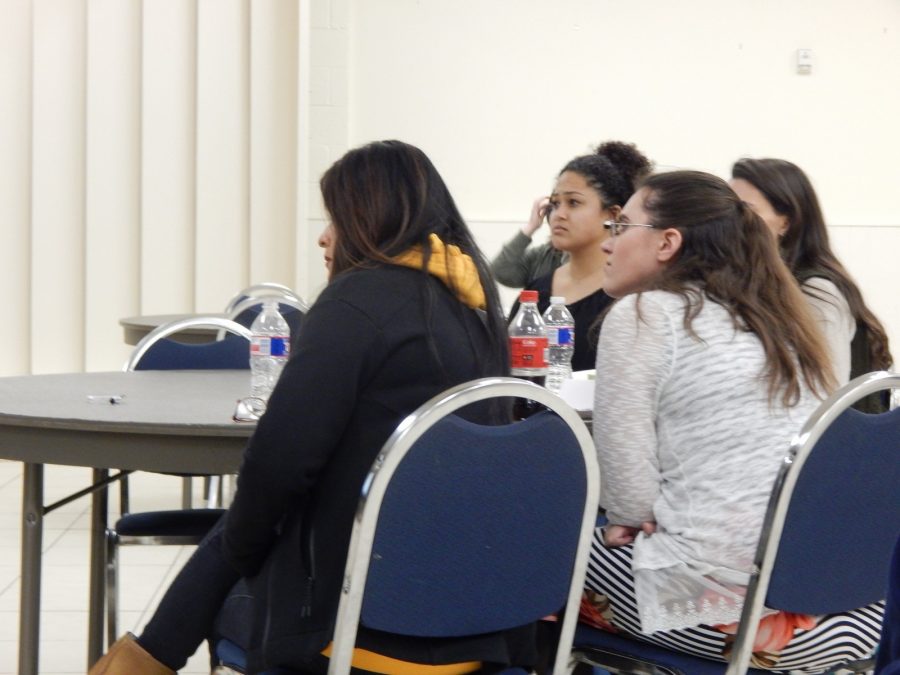Most women who are murdered by men knew them before the crime.
As in about 90 percent, said Mike Carroll, a retired Fort Worth Police Department homicide detective.
Carroll, speaking at Thursday night’s Personal Situational Awareness presentation at the Poly United Methodist Church, said that women are seen as a weaker target than men, and that male predators usually research women before they attack.
“Predators study you,” said Carroll to about 20 attendees at the Betty and Bobby Bragan Fellowship Hall. “They really do. They watch everything you do, everything you say. They study you and then they look for the weakest one in the crowd. It could be that you might not be weak but you’re really sympathetic.”
The presentation, which was attended only by women, was sponsored by the Social Justice League and Wesleyan students Katie Mathews and Alli Perez.
Using case studies and offender characteristics, Carroll’s presentation included such topics as signals to watch for when encountering a stranger, warning signals of abusive relationships, and drug/alcohol-facilitated sexual assaults.
Carroll also discussed factors that can help reduce their risk of becoming the target of a violent assault. He has served in the patrol, traffic, youth and undercover narcotics divisions before transferring to the homicide division in 1997, according to protectinglives.org.
“What are women’s greatest concerns? Weight,” Carroll said. “And what concern does society have on you? Being married and having children. Men know this. Because for me to be single my whole life, it’s ok for a man. For you (women) to be single your whole life, what are you? The old maid. ‘Don’t you want to get married? Don’t you want to have children?’ We [people] guilt you.”
Mathews, a senior criminal justice, said she hoped the event would benefit and inform women.
“I saw him from presentations a couple years ago, and thought that women could benefit, especially now,” Mathews said. “I just want women to know that they’re worth more and that they don’t need to take it.”
Andrea Upadhya, a junior political science major, said it was a great event but that excluding men was counterproductive.
“Yes, we need tips and the need to be educated on how to recognize these things but at the same time men need to be educated on the same things,” Upadhya said. “They need to be made aware on how situations are perceived and how they can help the women in their lives stay safe. Maybe there can be another event for everyone.”
Upadhya said she also hopes women left the presentation recognizing behavior patterns that would put them at risk.
“I know I have a lot of friends who have a hard time saying no to people and they try to be nice when they’re being asked for help like in a compromising situation like a parking lot,” Upadhya said. “My best friend will stop and talk to you and ask you about your whole life story while she’s trying to help you and it scares me. I’m really happy that she got to hear their story but that’s not a situation that she should be putting herself in.”
Kimmie Sims, a senior English major, said the event made her think of the women in her life and similar situations she’s faced.
“I’m just like, ‘What can you do to help those people in your life?’ like, ‘Oh my gosh, that sounds like someone I know,’” Sims said. “If you heard it, or if you don’t hear it, you don’t realize. You think they’re just being misogynistic. Maybe he’s just trying to be a manly man or like he’s just scared or I just have to be with him because that’s what love is like when it’s not.”
Carroll had some final advice for the attendees. Men, he said, should not attack the women that do them, including their mothers, wives and daughters.
“I’m here to tell you that it’s not supposed to be that way” Carroll said. “Don’t take anything from anyone.”
For more information, visit protectinglives.org or call the National Domestic Violence Hotline at 1-800-799-SAFE (7283).

Photo by Shaydi Paramore.
[embedyt] http://www.youtube.com/watch?v=-uZfHa6iEQA[/embedyt] Video by Shaydi Paramore.









![Pippin, played by Hunter Heart, leads a musical number in the second act of the musical. [Photo courtesy Kris Ikejiri]](https://therambler.org/wp-content/uploads/2025/04/Pippin-Review-1200x800.jpg)
![Harriet and Warren, played by Trinity Chenault and Trent Cole, embrace in a hug [Photo courtesy Lauren Hunt]](https://therambler.org/wp-content/uploads/2025/02/lettersfromthelibrary_01-1200x800.jpg)
![Samantha Barragan celebrates following victory in a bout. [Photo courtesy Tu Pha]](https://therambler.org/wp-content/uploads/2025/05/20250504_164435000_iOS-834x1200.jpg)





![Hunter Heart (center), the play's lead, rehearses a scene alongside other student actors. [Photo courtesy Jacob Sanchez]](https://therambler.org/wp-content/uploads/2025/04/thumbnail_IMG_8412-1200x816.jpg)
![Student actors rehearse for Pippin, Theatre Wesleyan's upcoming musical. [Photo courtesy Jacob Rivera-Sanchez]](https://therambler.org/wp-content/uploads/2025/04/Pippin-Preview-1200x739.jpg)
![[Photo courtesy Brooklyn Rowe]](https://therambler.org/wp-content/uploads/2025/05/CMYK_Shaiza_4227-1080x1200.jpg)

![Lady Rams softball wraps up weekend against Nelson Lions with a victory [6 – 1]](https://therambler.org/wp-content/uploads/2025/04/Screenshot-2025-04-04-100924-1200x647.png)
















